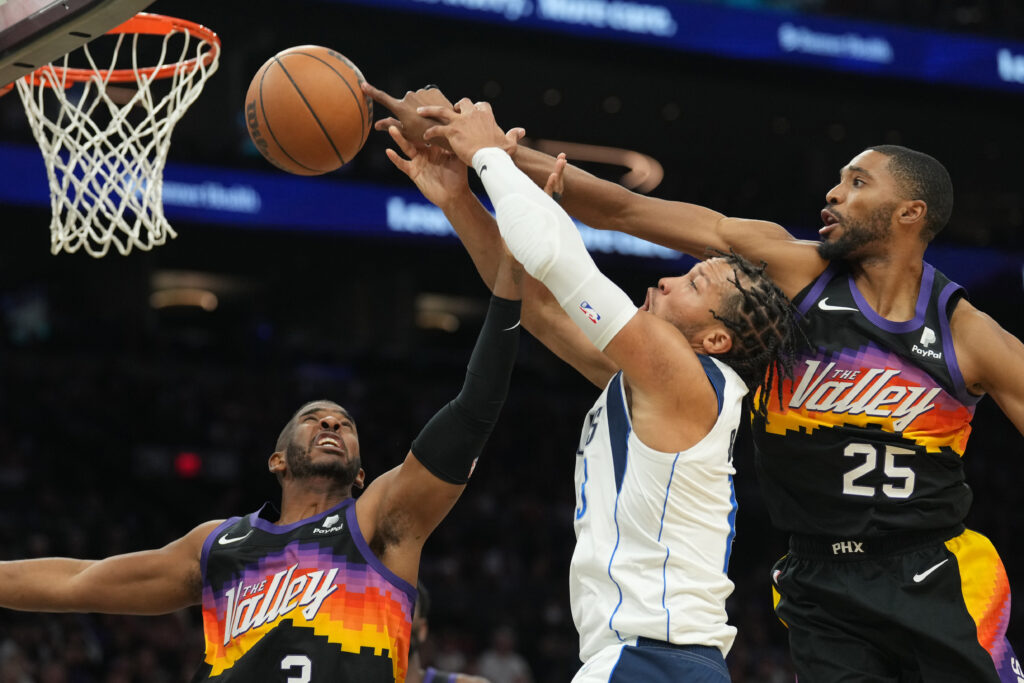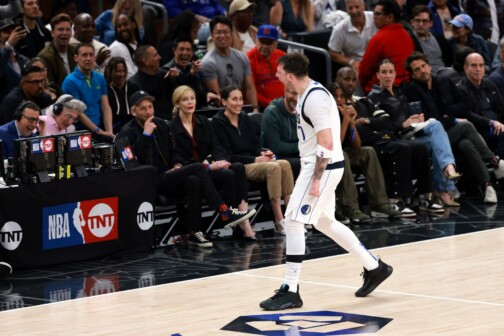The playoffs are complicated. Each series is its own story, and each game is its own chapter encompassing a dozen moments and plot points. But the playoffs can also be simple. Each of those moments, those plot points, falls into one of two buckets: the things we observe and the emotions they inspire within us. That’s what we’re here to talk about.
What We Saw
The odds weren’t in the Mavericks’ favor. The talent gap in this series is such that, to steal a win, Dallas’ players need to outperform expectations, and it probably needs to be the other way around for Phoenix. Neither happened last night, especially in the first half. The Mavericks lacked intensity and focus out of the gate, and by the time they got their legs under them, the Suns were up by 15 with 4:30 left in the first quarter. At that point, it was basically game over. You don’t make up 15-point gaps against these Suns on their home floor.
The Mavericks turned the ball over, they missed layups, and they couldn’t convert easy transition opportunities. On the other end, they couldn’t figure out how to defend the Suns’ pet plays: stack pick-and-roll and their elbow actions. Every possession was either an open mid-range shot for Devin Booker or Chris Paul (who treat those as layups), a lob and an easy shot for Deandre Ayton, or an open three.
Luka Doncic scored 45 points, but the Suns made him work for every point. As I predicted in my series preview, the Suns defended Doncic with a drop coverage featuring Mikal Bridges and Ayton, but Doncic saw aggressive help defense from all sides throughout the game. When Doncic got a favorable switch, the Suns loaded hard, with at least two players on the ball and zone on the back side.
He didn’t get much in the way of help, either. Apart from Maxi Kleber, who nailed five of his eight three-point attempts, the Mavericks couldn’t figure out how to attack the gaps and adapt to the Suns’ playoff speed on closeouts. Jalen Brunson and Spencer Dinwiddie, who are supposed to be this team’s key secondary attackers, couldn’t get anything going in the first three quarters.
A sliver of hope came in the fourth quarter. The Suns took their foot off the gas, and Jason Kidd went super small, with Dorian Finney-Smith at the five and all playmakers on the floor. The Mavs stretched the Suns behind the three-point line, and the driving lanes opened up. Dallas scored 35 points, 18 of which came in the paint. The small group also strung together several good defensive possessions, switching everything and fighting hard against Ayton in the paint. The Mavs pushed the pace, and the Suns struggled to keep up with cross-matches in transition.
Was the super-small ball a gimmick that caught the Suns off guard, or will we see the battle between David and Goliath for a reminder of this series? Or should Kidd play his other ace by having Kleber defend Paul? We’ll get answers in Game 2, but no matter what they are, the Mavs’ margin for error and the odds just got even smaller. —Iztok Franko
What It Felt Like
The cold sting of reality smacking the Mavericks across the face, reminding them how far they still have to go.
It was one thing to defeat a Utah team that emerged as Dallas’ ideal first-round matchup well before the regular season concluded. The Jazz were defensively fragile and mentally brittle; apply the right sort of pressure across enough minutes, and they’d inevitably shatter. Don’t get it twisted: it takes a good team to do that, and the Mavericks indisputably are one.
But last night was a 48-minute exhibition of how far good can be from great, and Phoenix is no ordinary brand of great. As Iztok wrote Monday morning, the Suns are the sort of juggernaut that, more often than not, concludes its season by hoisting the Larry O’Brien Trophy. They have precious few weaknesses, ones only another great team figures out how to exploit over a seven-game series. And if it weren’t obvious going in, the Suns drove the point home from the opening tip: the Mavericks likely aren’t that team.
They fought, mind you. They always do. Next to Doncic, grit is the very best thing this group has going for it. Yet late in the second quarter, the picture became clear. By then the Mavericks were midway through a flurry of nine made three-pointers in 13 attempts, with Luka scoring at a 50-point pace and Kleber unearthing his shooting stroke from Game 2 of the Utah series to drill five of his first six shots from beyond the arc … and Dallas trailed by 13. The margin would swell to the high teens for much of the game before shrinking to single digits late in the fourth quarter, a byproduct of Dallas’ pluck and Phoenix’s sky-high shooting percentage normalizing a tad.
The Mavericks have cards left to play. They can lean on what our Brian Dameris calls their microball lineup—the three playmakers plus Finney-Smith and Reggie Bullock—for longer stretches, or they can start Kleber over Dwight Powell, who looks like he may be ineffective for a second straight series. But leave it to JaVale McGee, of all people, to apply the exclamation point when he pickpocketed Doncic and stormed down the floor for a breakaway dunk: it will not take Phoenix’s best to defeat Dallas. And it will take every bit of the Mavericks’ to stay alive. —Mike Piellucci
Authors

Iztok Franko
View Profile






